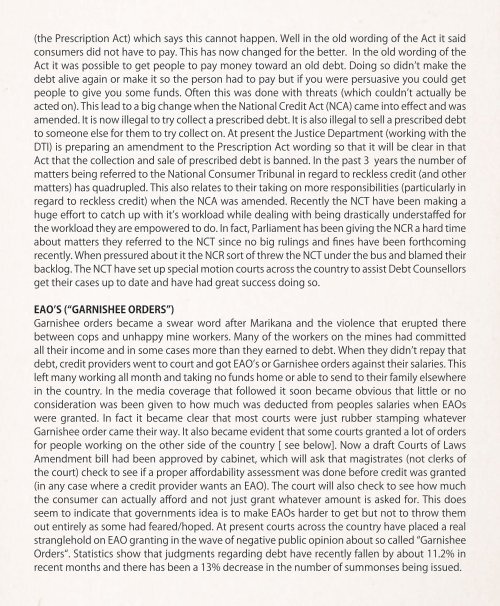Debtfree DIGI Magazine - May 2016
Debtfree DIGI - SA's Free Debt Counselling and Debt Review industry magazine. News & articles all about debt review and the Debt Review Awards which are currently under way.
Debtfree DIGI - SA's Free Debt Counselling and Debt Review industry magazine. News & articles all about debt review and the Debt Review Awards which are currently under way.
You also want an ePaper? Increase the reach of your titles
YUMPU automatically turns print PDFs into web optimized ePapers that Google loves.
(the Prescription Act) which says this cannot happen. Well in the old wording of the Act it said<br />
consumers did not have to pay. This has now changed for the better. In the old wording of the<br />
Act it was possible to get people to pay money toward an old debt. Doing so didn’t make the<br />
debt alive again or make it so the person had to pay but if you were persuasive you could get<br />
people to give you some funds. Often this was done with threats (which couldn’t actually be<br />
acted on). This lead to a big change when the National Credit Act (NCA) came into effect and was<br />
amended. It is now illegal to try collect a prescribed debt. It is also illegal to sell a prescribed debt<br />
to someone else for them to try collect on. At present the Justice Department (working with the<br />
DTI) is preparing an amendment to the Prescription Act wording so that it will be clear in that<br />
Act that the collection and sale of prescribed debt is banned. In the past 3 years the number of<br />
matters being referred to the National Consumer Tribunal in regard to reckless credit (and other<br />
matters) has quadrupled. This also relates to their taking on more responsibilities (particularly in<br />
regard to reckless credit) when the NCA was amended. Recently the NCT have been making a<br />
huge effort to catch up with it’s workload while dealing with being drastically understaffed for<br />
the workload they are empowered to do. In fact, Parliament has been giving the NCR a hard time<br />
about matters they referred to the NCT since no big rulings and fines have been forthcoming<br />
recently. When pressured about it the NCR sort of threw the NCT under the bus and blamed their<br />
backlog. The NCT have set up special motion courts across the country to assist Debt Counsellors<br />
get their cases up to date and have had great success doing so.<br />
EAO’S (“GARNISHEE ORDERS”)<br />
Garnishee orders became a swear word after Marikana and the violence that erupted there<br />
between cops and unhappy mine workers. Many of the workers on the mines had committed<br />
all their income and in some cases more than they earned to debt. When they didn’t repay that<br />
debt, credit providers went to court and got EAO’s or Garnishee orders against their salaries. This<br />
left many working all month and taking no funds home or able to send to their family elsewhere<br />
in the country. In the media coverage that followed it soon became obvious that little or no<br />
consideration was been given to how much was deducted from peoples salaries when EAOs<br />
were granted. In fact it became clear that most courts were just rubber stamping whatever<br />
Garnishee order came their way. It also became evident that some courts granted a lot of orders<br />
for people working on the other side of the country [ see below]. Now a draft Courts of Laws<br />
Amendment bill had been approved by cabinet, which will ask that magistrates (not clerks of<br />
the court) check to see if a proper affordability assessment was done before credit was granted<br />
(in any case where a credit provider wants an EAO). The court will also check to see how much<br />
the consumer can actually afford and not just grant whatever amount is asked for. This does<br />
seem to indicate that governments idea is to make EAOs harder to get but not to throw them<br />
out entirely as some had feared/hoped. At present courts across the country have placed a real<br />
stranglehold on EAO granting in the wave of negative public opinion about so called “Garnishee<br />
Orders“. Statistics show that judgments regarding debt have recently fallen by about 11.2% in<br />
recent months and there has been a 13% decrease in the number of summonses being issued.


















